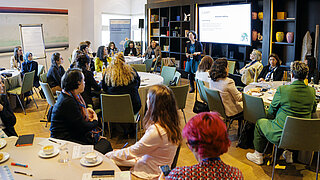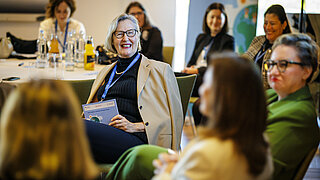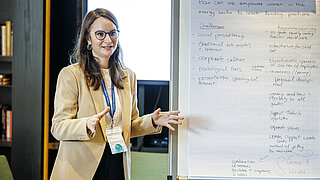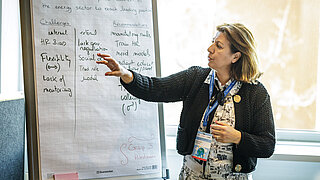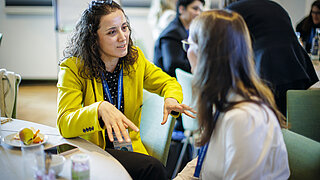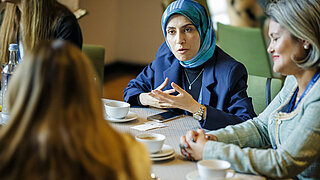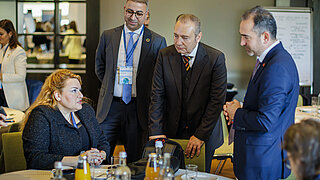Women in the Energy Transition – A Morning of Inspiration at the 6th Turkish-German Energy Forum
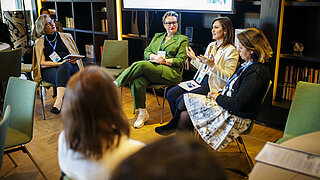
On the morning of the 6th Turkish-German Energy Forum, a special gathering set the tone for the day: the Women in Energy Transition breakfast session. This event brought together leading professionals and advocates from the energy sector to discuss the vital role of gender equality in shaping a sustainable energy future. The event, moderated by Kristina Haverkamp, CEO of the German Energy Agency (dena), was part of the broader framework of the Turkish-German Energy Forum.
Ms. Haverkamp opened the session by highlighting the critical importance of diversity in the energy sector. “Innovation thrives on diverse perspectives,” she emphasised, reminding the audience that achieving climate goals requires the ingenuity and leadership of all genders.
The event transitioned to a welcome address by Beatrix Massig, Deputy Head of Division at the German Federal Ministry of Economic Affairs and Climate Action (BMWK). She shared insights from her work in the Turkish-German Energy Partnership, highlighting how gender equality is integrated into the partnership as part of Germany’s commitment to embedding inclusivity into global energy strategies.
The heart of the session was an engaging panel discussion where the speakers shared candid insights into their career journeys, the challenges they’ve faced, and their visions for the future:
- Ebru Arıcı, Vice President of the Turkish Wind Energy Association and CEO of Arı-Es Energy, spoke about her path to leadership in a traditionally male-dominated field. She also reflected on her active role with the Green Collar Women Association, which collaborates with the Turkish-German Energy Partnership on gender initiatives.
- Pınar Ersoy, Chief Representative of DZ Bank in Türkiye and President of AHK Türkiye, shared her experiences navigating the energy sector as a woman leader. Her reflections on breaking barriers and efforts within the AHK working group for women in business resonated deeply with the audience.
- Dr Nadia Horstmann, Head of International Coordination Energy at Bundesnetzagentur and Co-Chair of the Women in Energy Working Group of the Council of European Energy Regulators, brought a global perspective. She presented findings from a survey on women’s employment in the European Energy Regulatory Authorities , underlining the systemic changes needed to create equitable workplaces.
After the panel, Sedef Budak, Founder President of the Turkish Women in Renewables and Energy (TWRE) and the Green Collar Women Association (GCWA), took the stage. Her presentation, “Gender Equality Research in the Turkish Energy Sector: Women's Employment, Global and Local Dynamics,” offered a data-driven exploration of the barriers women face and the pathways to empowerment. The study was conducted within the framework of the Turkish-German Energy Partnership and can be found here. With many years of advocacy experience, Ms Budak’s insights were inspiring, emphasising the critical role of civil society in driving change.
The session then moved into breakout discussions, an interactive segment where participants addressed two key questions:
- How can we better attract women to work in the energy transition?
- How can we empower women in the energy sector to reach leading positions?
Small groups facilitated by expert moderators delved into challenges and brainstormed actionable recommendations. Flip charts captured a wide range of ideas, from targeted mentorship programmes to policy interventions. Participants shared their perspectives, drawing on diverse experiences from Türkiye, Germany, and beyond. Returning to the plenary, group representatives summarised their discussions. From innovative recruitment strategies to creating supportive networks for women, the outputs reflected a collective determination to drive progress.
The session concluded with a networking segment, giving participants the chance to connect further and deepen collaborations. In her closing remarks, Ms Haverkamp affirmed that the journey to gender equality in the energy sector is a shared responsibility—and one that benefits everyone. As the morning’s conversations made clear, empowering women is not just about equity; it is essential to achieving a sustainable energy future.
